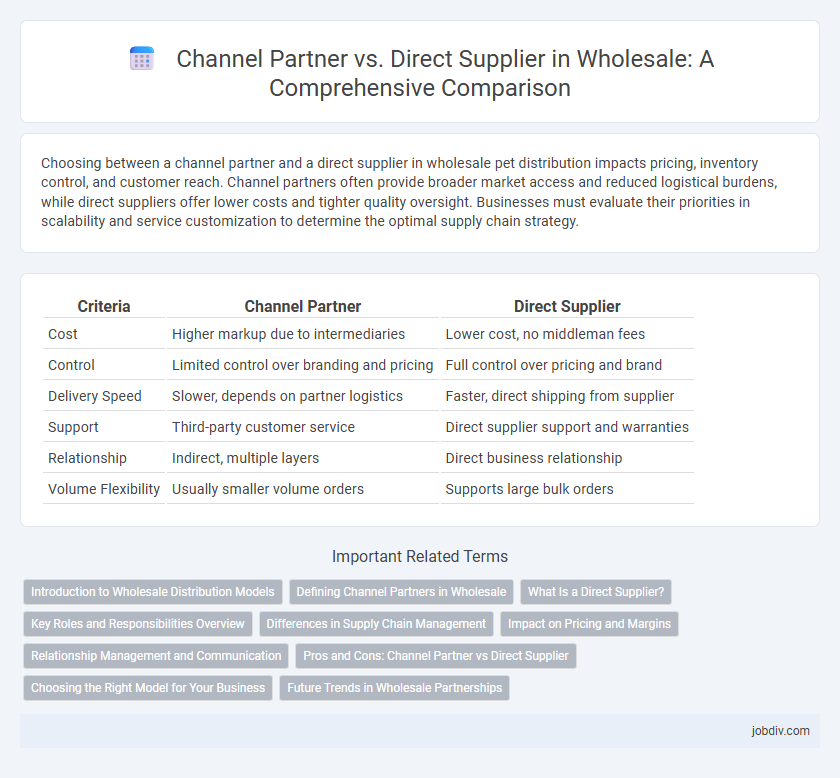Choosing between a channel partner and a direct supplier in wholesale pet distribution impacts pricing, inventory control, and customer reach. Channel partners often provide broader market access and reduced logistical burdens, while direct suppliers offer lower costs and tighter quality oversight. Businesses must evaluate their priorities in scalability and service customization to determine the optimal supply chain strategy.
Table of Comparison
| Criteria | Channel Partner | Direct Supplier |
|---|---|---|
| Cost | Higher markup due to intermediaries | Lower cost, no middleman fees |
| Control | Limited control over branding and pricing | Full control over pricing and brand |
| Delivery Speed | Slower, depends on partner logistics | Faster, direct shipping from supplier |
| Support | Third-party customer service | Direct supplier support and warranties |
| Relationship | Indirect, multiple layers | Direct business relationship |
| Volume Flexibility | Usually smaller volume orders | Supports large bulk orders |
Introduction to Wholesale Distribution Models
Wholesale distribution models primarily include channel partners and direct suppliers, each offering distinct advantages in supply chain efficiency and market reach. Channel partners act as intermediaries, leveraging established networks to distribute products more broadly, while direct suppliers provide products straight from manufacturers, ensuring greater control over pricing and inventory. Understanding the balance between these models helps businesses optimize distribution strategies, reduce costs, and improve customer service in wholesale markets.
Defining Channel Partners in Wholesale
Channel partners in wholesale refer to intermediaries such as distributors, dealers, or resellers who facilitate the distribution of products from manufacturers to end customers or retailers. These partners enhance market reach, provide localized customer support, and manage inventory logistics, allowing manufacturers to scale operations efficiently without the need for direct customer engagement. Channel partnerships are crucial for optimizing supply chain management and expanding product availability across diverse geographic regions.
What Is a Direct Supplier?
A direct supplier is a manufacturer or producer who sells products straight to wholesalers or retailers without intermediaries, ensuring better control over pricing and inventory. This relationship often leads to faster order fulfillment and higher quality assurance due to direct communication and streamlined logistics. In wholesale, relying on direct suppliers can increase profit margins and reduce the risk of supply chain disruptions compared to channel partners.
Key Roles and Responsibilities Overview
Channel partners serve as intermediaries who expand market reach, manage customer relationships, and provide localized support, while direct suppliers focus on product manufacturing, inventory management, and order fulfillment. Channel partners are responsible for sales, marketing, and after-sales service within specific regions, enabling customized customer engagement and demand generation. Direct suppliers maintain control over pricing, quality assurance, and supply chain logistics, ensuring product availability and compliance with standards.
Differences in Supply Chain Management
Channel partners and direct suppliers differ significantly in supply chain management by the degree of control and communication involved. Direct suppliers manage inventory, logistics, and order fulfillment internally, ensuring streamlined processes and faster response times. Channel partners add intermediary layers, which can introduce complexity in coordination but often expand market reach and distribution efficiency.
Impact on Pricing and Margins
Channel partners add intermediary layers that often increase product pricing and reduce profit margins for wholesalers compared to direct suppliers. Direct suppliers enable better control over wholesale pricing, resulting in higher margins by eliminating middleman fees and streamlining supply chains. Wholesale businesses working directly with manufacturers benefit from cost efficiency and competitive pricing that improve overall profitability.
Relationship Management and Communication
Channel partners foster collaborative relationship management by acting as intermediaries, ensuring consistent communication between manufacturers and end clients, which enhances trust and market reach. Direct suppliers maintain direct communication lines, enabling faster decision-making and personalized service but require robust internal resources to manage customer interactions effectively. Effective relationship management in wholesale relies on balancing the scalability of channel partners with the control and customization offered by direct supplier communication strategies.
Pros and Cons: Channel Partner vs Direct Supplier
Channel partners provide wholesalers with broader market reach and localized customer support, though they may increase costs through added layers and reduce control over branding. Direct suppliers offer cost savings and greater control over product quality and pricing, but may lack the extensive distribution network and customer relationships that channel partners bring. Choosing between them depends on priorities such as market penetration, cost efficiency, and supply chain control.
Choosing the Right Model for Your Business
Selecting the appropriate distribution model depends on factors such as control over pricing, customer relationships, and supply chain management. Channel partners offer extensive market reach and localized expertise, while direct suppliers provide greater margin control and direct communication with clients. Evaluating business goals, product complexity, and scalability needs helps determine whether a channel partner or direct supplier aligns best with your wholesale strategy.
Future Trends in Wholesale Partnerships
Future trends in wholesale partnerships indicate a growing shift towards hybrid models combining channel partners and direct suppliers to enhance market reach and operational efficiency. Advanced digital platforms and data analytics empower channel partners to offer personalized solutions while direct suppliers benefit from streamlined supply chains and real-time inventory management. Emphasis on sustainable practices and integrated AI-driven forecasting tools will further transform collaboration strategies between wholesalers and their partners.
Channel Partner vs Direct Supplier Infographic

 jobdiv.com
jobdiv.com